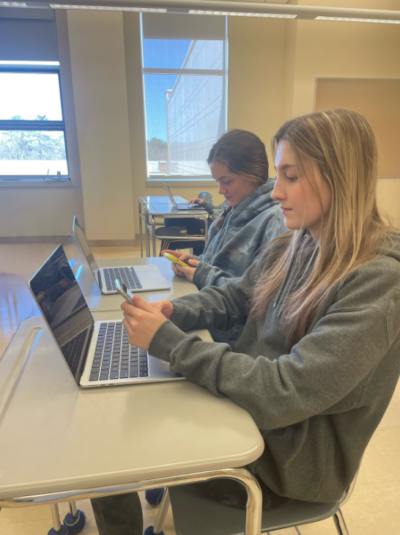According to The New York Times, screen usage for teenagers and tweens has increased “by 17 percent from 2019 to 2021”. This rise in screen time is growing more rapidly than in the past four years. Furthermore, a recent cdc.gov article stated kids ages 8-18 spend an average of 7.5 hours on a device for entertainment purposes every day. Meaning, that in just one year, these individuals are spending a total of nearly three thousand hours on technology.
This statistic is also apparent at the high school, as shown in a recent survey conducted by The Bradford. When 24 students, from all grade levels, were asked to give the average amount of sleep they get per night, answers varied from 5 to 8.5 hours, with an average of approximately 6.5 hours.
In recent interviews, students were given the chance to share their experiences with technology. “I have accidentally spent an hour or more scrolling on social media without even realizing it,” said Lila Plenge ’26. With this time wasted, students often stay up later finishing homework assignments or other tasks, equating to less sleep.

In addition to the first question, participants were asked to rank how much social media or technology impacts their sleep on a scale from 1 to 5 (1 being never impacts and 5 being always impacts). Results showed an average of 3 or “sometimes impacts”. 20 percent of the students interviewed ranked a “4” (“often impacts”) or greater. Additionally, this group had an average of 5.5 hours of sleep per night (one hour less than the average student at the high school).
Therefore, there is a clear correlation between the quantity of sleep and technology usage at the high school. If 20 percent of the high school population is being negatively affected by social media, specifically regarding their sleep, one solution is to further explore the question: how detrimental are high school student’s poor sleep habits to their health?
“If I have not gotten a sufficient amount of sleep, I usually feel a little confused and it is more difficult to concentrate in school,” said Avery Thornton ’25.

Ms. Margaret Walendin, the Director of School Counseling at the high school, took a class on sleep during her time at Brown University. The course was taught by Mary Caskatin, a sleep researcher who has especially focused on the “consequences of insufficient sleep for adolescents”, according to vivo.brown.edu.
“Adolescence is a period where you are still growing and your brain is still growing, so, sleep deprivation during that type of period is more harmful than it probably would be for an older adult,” said Walendin.
She also mentioned that with a lack of sleep comes a shortened attention span, which is not ideal during a seven-hour school day. Finally, “general mental health functioning” often declines when teenagers are sleep-deprived.
Guidance counselor Ms. Annis Chwalek, gave a similar response. “Sleep is when your brain cleans itself and when your brain is developing you want it to be as healthy and clean as possible,” said Chwalek. Therefore, adolescents’ sleep is especially significant in this period of development.
Not only is sleep vital to the growth of teenagers, but also to their mental health. According to childmind.org, “teens who don’t sleep enough feel anxious, stressed and depressed”, which often leads to difficulty while falling asleep, and therefore individuals can fall into a dangerous cycle.
Cooper Reisner ‘26, agrees with the childmind.org study. “I have noticed my focus level and mood begin to worsen when I have not gotten enough sleep,” said Reisner.
All in all, sleep is a fundamental part of a healthy human, especially a growing one. The issue of sleep deprivation due to social media and technology has a significant impact on students across all grades at the high school.
“I have seen a decrease in students’ mental health due to a lot of different reasons and sleep is probably a lot of them,” said Chwalek.

